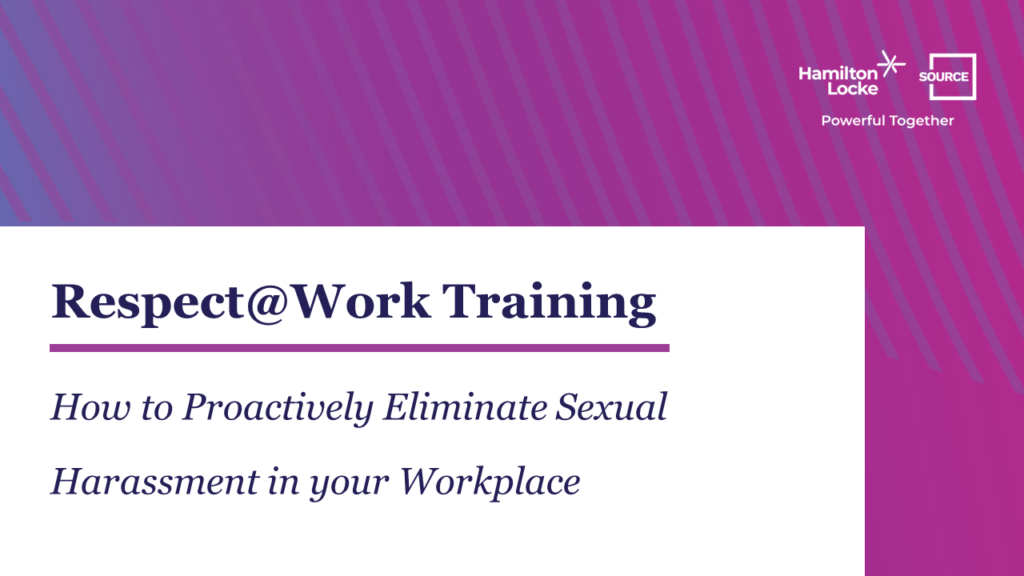On 28 November 2022, the Anti-Discrimination and Human Rights Legislation Amendment (Respect at Work) Act 2022 (Act) passed both houses of Parliament and introduced some of the most substantial changes to Australia’s discrimination and sexual harassment laws in recent history.
What you need to know
The Act received Royal Assent on 12 December 2022 and is now in operation, which means:
- employers are now required to take proactive steps to prevent sexual harassment, sex discrimination, victimisation and conduct that causes a workplace environment that is hostile on the ground of sex. This includes where conduct is not directed at a particular person, but nevertheless creates a hostile workplace environment.
- conduct that subjects someone to a workplace environment that is hostile on the ground of sex is expressly prohibited.
- representative claims on behalf of one or more person may be brought in the Federal Court.
The Australian Human Rights Commission’s (AHRC) enhanced powers to enforce and investigate compliance, without individuals needing to make complaints, will come into effect 12 months after the Act received Royal Assent.
Key changes
The Act introduces several changes designed to ensure safer, more respectful and more equitable workplaces. The key amendments include:
1. Introducing a new positive duty on employers to take ‘reasonable and proportionate measures to eliminate, as far as possible’ sex discrimination, sexual harassment, victimisation and conduct that causes a workplace environment that is hostile on the ground of sex .
This duty shifts the burden from individuals needing to make complaints after an incident has occurred, to employers needing to take proactive steps to prevent harassment from occurring in the first place.
In considering whether all reasonable and proportionate steps have been taken to comply with this duty, the following matters will be considered:
- the size, nature and circumstances of the employer’s business;
- the employer’s resources, whether financial or otherwise;
- the practicability and the cost of steps to eliminate the conduct; and
- any other relevant matter.
The intention of these provisions is to recognise that the steps that must be taken by a small employer will differ from those that must be taken by a large employer. Other factors, such as whether or not the employer operates in an industry that is dominated by one sex, will also be relevant in determining the steps that must be taken.
2. Providing new powers for the AHRC to enforce compliance, including by allowing the AHRC to perform investigations into compliance with the new positive duty mentioned above, as well as investigate ‘systemic unlawful discrimination.’
The AHRC will also be given powers similar to those of the Fair Work Ombudsman to issue compliance notices and enter into enforceable undertakings with employers.
These changes transform the AHRC from a reactive body, whose powers are only enlivened when a complaint has been made by an individual, to a proactive enforcement agency empowered to investigate matters and take steps without the need for an individual complainant to drive the process.
3. Expressly prohibiting conduct which subjects someone to a workplace environment that is hostile on the ground of sex to provide greater certainty where conduct is not directed at a particular person, but nonetheless results in a hostile working environment. This may include displaying obscene or pornographic materials, general sexual banter, inuendo, and offensive jokes which result in one sex feeling unwelcome or excluded.
4. Allowing representative claims to be brought in the Federal Court on behalf of more than one person. In effect, this will facilitate proceedings being brought by more than one person against employers where it is alleged they have failed to comply with their obligations under discrimination legislation, including the new provisions in relation to an employer’s positive duty and hostile workplaces.
Previously, representative claims could be brought in the AHRC, however, if the matter was not resolved and terminated by the AHRC, there were significant procedural barriers preventing the representative body continuing to lead the claim in the Federal Court.
This is particularly important as claims may be brought even where there is no allegation that any one individual has suffered from harassment or discrimination. It would be sufficient to claim that the employer failed to comply with its positive duty, or otherwise subjected employees to a hostile work environment on the ground of sex.
5. The time frame in which the AHRC may not terminate a complaint (other than relating to breaches of the Sex Discrimination Act 1984 (Cth) (SD Act)) has been increased from 6 months to 24 months after the alleged acts, omissions or practices giving rise to the complaint took place. Complaints relating to breaches of the SD Act were already provided the extended 24 month time frame.
The default costs protections which were originally included as part of the bill have been removed for now, and will be subject to a review by the Attorney General which is anticipated to be completed by May 2023. If these protections are introduced as intended at a later date, each party will bear their own costs in an unlawful discrimination proceeding (subject to the court’s discretion to alter this position).
Next steps
We recommend that employers review their policies and business practices to ensure they meet the required standards, noting that the changes closely reflect many obligations that currently exist at law. To assist with the review, we recommend visiting the following website recently launched by the AHRC to help employers prevent, and workers respond to, workplace sexual harassment.
Any review should involve:
1. Evaluating the effectiveness of current anti-discrimination and harassment policies, including considering whether they:
- adequately address the new obligations created by the Safe@Work legislation;
- foster a safe, equitable environment;
- provide adequate reporting processes and procedures;
- are effectively communicated to staff, including whether they are continually accessible to staff; and
- are reviewed and updated, and whether any changes are communicated to staff.
2. Considering what training, if any, is provided to employees to promote a safe and equitable work environment. Consider whether there is an opportunity to undergo additional training such as bystander intervention.
3. Analysing your current risk management framework, including whether the risks of sexual harassment or a hostile work environment have been considered, and the strategies which have been put in place to mitigate those risks.
4. Examining management’s role in promoting a safe, respectful and equitable workplace, including ensuring that management are taking proactive steps and exercising appropriate due diligence in doing so.
Hamilton Locke and Source can help you review your policies, conduct effective training and analyse your current risk management framework. If you would like help with any of these things, please contact James Simpson (Partner, Hamilton Locke) or Sean Melbourne (Director of Source).

Source provides training to help employers comply with their new obligations to proactively eliminate sexual harassment, sex discrimination, victimisation and hostile work environments.
Source trains managers to understand their role in promoting a safe, respectful and equitable workplace, including what proactive steps they need to take to ensure their workplace is compliant. Managers are provided with practical tools and resources they can use to ensure their workplace meets the Respect@Work requirements.
Source also trains employees on appropriate workplace behaviour, how to create a respectful work environment and what to do when inappropriate behaviour occurs. Providing this training to employees is part of complying with an employer’s duty to promote a safe and respectful environment.
To arrange training for your workplace, or for more information, please contact Sean Melbourne -Director of Source (sean.melbourne@sourceservices.com.au) here.
